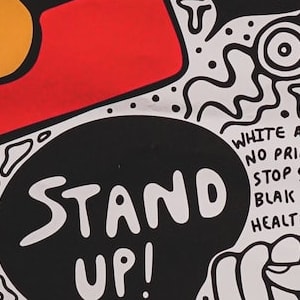stand up with: Idiom Meaning and Origin
What does ‘stand up with’ mean?
The idiom "stand up with" means to accompany or support someone in a public event or ceremony, usually as a partner or a member of the wedding party.

Idiom Explorer
The idiom "throw in with" means to join or align oneself with a particular group or cause, usually by making a commitment or showing support.
The idiom "take someone's part" means to support or defend someone in an argument or disagreement, often without considering the opposing viewpoint.
The idiom "take a stand" means to publicly express one's opinion or position on a certain issue, often in a bold and assertive manner.
The idiom "stick with" means to continue with or remain loyal to something or someone. It implies not giving up or changing one's mind despite difficulties or temptations.
The idiom "stick together" means to support and stay united with a group of people, especially during difficult times.
The idiom "stand with" means to support or be in solidarity with someone or a cause. It implies taking a stance on an issue or aligning oneself with a particular person or group.
The idiom "stand up and be counted" means to express one's opinion or support for something openly and without fear, especially in a situation where it might be unpopular or risky. It implies taking a courageous and assertive stance, showing willingness to be noticed and recognized for one's beliefs or actions.
The idiom "stand up" means to remain resolute or loyal in a difficult or challenging situation. It can refer to someone upholding their principles or to someone defending or supporting someone else.
The idiom "stand tall" means to be confident and proud, especially in the face of adversity or criticism.
Uncovering Unique Connotations
Based on extensive research, the idiom "stand up with" is a commonly used expression in informal conversations. It has multiple meanings and can vary depending on the context in which it is used.
When examining the etymology of the idiom "stand up with," it's important to consider its individual components. The word "stand" originates from Old English and has a long history in the English language. It originally meant to assume or maintain an upright position on one's feet and has since evolved to include various figurative meanings. The word "up" intensifies or reinforces the action of standing. Lastly, the word "with" is used to indicate association or accompaniment in this context.
One possible interpretation of "stand up with" is providing support or solidarity to someone or something. This can be shown through defending their beliefs or actions, or actively assisting them in achieving a specific goal. This idiom conveys loyalty and commitment, suggesting a willingness to stand alongside them even in challenging situations.
Another interpretation of this idiom is its literal usage, referring to physically standing next to or alongside someone. This can occur in social settings like attending an event or gathering together. It emphasizes unity and togetherness, highlighting the physical presence and shared experience of standing side by side.
Additionally, "stand up with" can also mean accompanying someone to a particular occasion or event. This usage implies a supportive role and offers company, indicating that the person being "stood up with" is not alone in their engagement.
The idiom "stand with" is related to "stand up with." It shares a similar meaning of supporting or standing in solidarity with someone or something. When "stand with" is used, it indicates aligning oneself with a particular cause or belief, exhibiting loyalty and support.
Another related idiom is "stand up," which also shares a similar meaning to "stand up with." "Stand up" means to support or defend someone or something, often in the face of opposition or adversity. It conveys the idea of taking a stand and not backing down.
"stand behind" is another related idiom that has a similar meaning to "stand up with." When someone "stands behind" another person, it means they support and advocate for them. It implies a sense of loyalty and solidarity, indicating that they will stand by the person's side.
The idiom "stand by" is also related to "stand up with." It means being prepared and ready to offer support or assistance when needed. It shows a sense of reliability and commitment, indicating a willingness to be there for the person or cause.
Lastly, the idiom "stand up and be counted" is related to "stand up with." It encourages individuals to take a stand and make their voices heard. It signifies the importance of actively participating and speaking out for what one believes in.
The idiom "stand up with" has multiple meanings and applications. It can denote support or defense of someone or something, physical proximity to another person, or the act of accompanying someone to a specific event. The richness and versatility of this idiom make it a valuable component of the English language, allowing for nuanced expressions of loyalty, companionship, and solidarity. The idiom "stand up with" serves as a reminder of the complex interplay between language and human interaction, offering glimpses into the intricacies of human relationships and our shared experiences.
Example usage
Examples of how the idiom "stand up with" can be used in a sentence:
- She asked her best friend to stand up with her at her wedding.
- The young man was nervous to stand up with his classmates and give a presentation.
- The father proudly stood up with his daughter as she received her graduation diploma.
More "Verb" idioms



